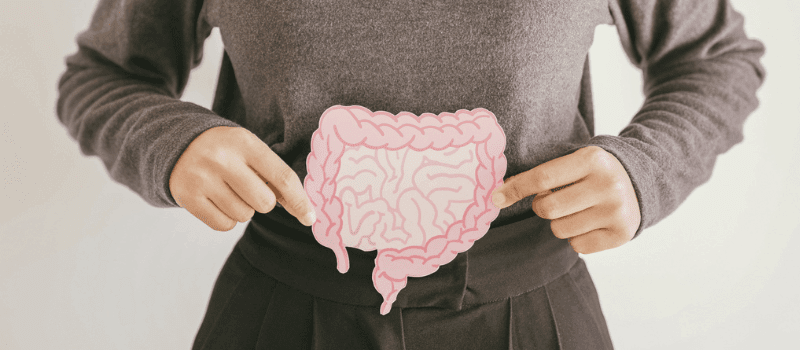Gut Health

Studies suggest that gut health can affect the skin and influence skin conditions. It has been shown that the gut or digestive system and skin are constantly interacting through the gut-skin axis. This could mean that some of the skin issues you’re concerned about (redness, itchiness, acne, and more) may be related to what’s going on in your gut.
What is the gut-skin axis?
The gut-skin axis is a concept surrounding the relationship between the gut microbiome and skin health (or the interaction between the gut and the skin). According to research, when the gut health or digestive balance is off, the effects can show up on the skin in the form of irritation or inflammation.
The gut contains 70% of the immune system, which plays a role in digestion, nutrient absorption, hormone regulation, and other important functions. An imbalance in the gut changes how your immune system reacts, as well as releases pro-inflammatory cytokines throughout the body. These support, trigger, or increase inflammation and affect the body’s largest organ.
These changes can contribute to the development of inflammatory skin diseases, such as:
- Acne
- Rosacea
- Atopic dermatitis
- Psoriasis
How does diet affect your gut microbiome?
The gut is home to trillions of good and bad bacteria. The good ones aid in digestion as well as the absorption of nutrients, while the bad ones trigger inflammation. A healthy gut or digestive system has a ratio of about 80 to 85% good/neural bacteria and 15 to 20% bad bacteria.
When this balance is disrupted, the bad bacteria can trigger digestive issues and skin problems. A diet high in sugar and processed foods can upset the bacteria balance, decreasing the good bacteria and diversity in the gut. On the contrary, a diet rich in fruits, vegetables, fiber, antioxidants, and probiotics improves gut health.
Other factors that can upset this balance or disrupt gut microbiota include:
- Prolonged use of antibiotics
- Smoking
- Excessive alcohol
- Excessive stress
- Insufficient sleep
How does an unhealthy gut show up on the skin?
Studies suggest that many skin changes occur alongside changes or disruptions in the gut microbiome. Atopic dermatitis or eczema is one of the skin issues linked to gut health and is associated with an increased amount of harmful species of bacteria and lower bacterial diversity and levels of beneficial species.
Here are a few other ways an unhealthy gut might show up on the skin:
- Acne – several studies found that those with acne have higher levels of inflammation in the gut.
- Rosacea – this condition has been associated with gut issues, one of which is small intestinal bacterial overgrowth (SIBO).
- Psoriasis – this skin condition has been linked to inflammatory bowel disease (IBD) and SIBO. Many of those with psoriasis also had IBD and saw an improvement in psoriasis symptoms after receiving IBD treatment.
- Dullness and aging – the inflammation caused by an unhealthy gut can lead to skin issues that can make the skin look dull, tired, and older.
How to improve gut health for glowing and healthy skin
A few things that can help include:
- Fill your diet with fiber, fruits, vegetables, and antioxidants.
- Take probiotic supplements.
- Limit your consumption of fast and processed foods.
- Stay hydrated.
- Manage stress levels (through physical activity, yoga, or breathing exercises).
- Get enough sleep (7 to 9 hours each night).
- Reduce alcohol consumption.
- Follow a skincare routine that suits your skin type.
- Talk to a skincare expert or an aesthetic doctor for tailored advice suited to what your skin needs.
How can we help?
Prolonged and improper use of antibiotics can disrupt the gut microbiota and lead to antibiotics-related diarrhea. Antibiotics, which target both good and bad bacteria, can reduce gut flora diversity and cause lasting changes. This is why we offer RESTORE, a probiotic solution that can restore gut health while and after taking antibiotics.
RESTORE is developed by a Singapore-based gut microbiome company. It is specifically formulated to restore gut health and function during and after a course of antibiotics. It can help reduce bloating, abdominal pain, indigestion, and antibiotics-related diarrhea. It can reduce damage to the gut flora by:
- Restoring gut microbiome
- Promoting the growth of beneficial bacteria
- Delivering beneficial active ingredients further into the gastrointestinal tract
- Providing psychological benefits for wellbeing
Potential treatments are as follows:
